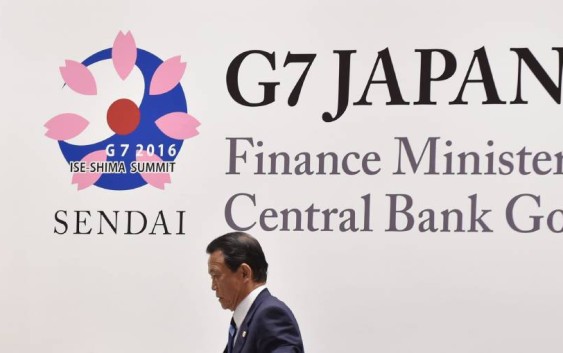The Japan Times – May 23, 2016 – Two days of talks last week between finance chiefs from the world’s biggest advanced economies at a hot springs resort in Sendai were marked by some of the sharpest dissonance in years between the U.S. and Japan over exchange-rate policies.
The tensions at the gathering of Group of Seven central bank governors and finance ministers highlighted a lingering division between the G-7’s two biggest members over the trading conditions that can justify government intervention in currency markets.
Underscoring the wider challenge of tackling the global slowdown, the policymakers agreed on common risks to the international economy but showed no appetite for laying down a shared strategy to combat the problem.
The lack of ministerial consensus over which policy levers to pull comes as Prime Minister Shinzo Abe prepares his heavily indebted nation for what may be another dose of spending to help the struggling economy. Ideally, he’d like the blessing of his G-7 peers before doing so, but expectations are low that national leaders can go one step further on any economic accord when they meet in Mie Prefecture later this week.
“Globally coordinated stimulus and cooperative exchange-rate management look a distant prospect amid deep G-7 divisions,” said Frederic Neumann, co-head of Asian economic research at HSBC Holdings Plc in Hong Kong. “Japan’s desire to attain acquiescence for intervention to prevent yen strength is running into resistance from trading partners worried about their own competitiveness amid sluggish growth.”
Comments on the currency’s moves by Finance Minister Taro Aso in Sendai on Friday and Saturday hinted at growing frustration about the impact on exporters after the yen surged 9 percent this year versus the dollar, spurring speculation that the Finance Ministry may intervene. Aso raised the issue in a meeting with U.S. Treasury Secretary Jacob J. Lew. The yen closed at 110.15 per dollar on May 20.
“I told him that one-sided, abrupt, and speculative moves were seen in the FX market recently, and abrupt moves in the currency market are undesirable and the stability of currencies is important,” Aso said to reporters.
That stance got short shrift from Lew, who repeated his view that the yen’s movement hasn’t been overly volatile. “It’s a pretty high bar to have disorderly conditions,” Lew told reporters.
To be sure, Japan remains a long way from its first intervention since 2011, when the G-7 sanctioned selling the yen to aid the country’s recovery after a devastating earthquake, tsunami and nuclear meltdown. A strengthening dollar amid rising bets that the U.S. Federal Reserve may lift interest rates over coming months is helping ease pressure on Japan’s exporters.
Aso also made it clear that the difference of opinion with the U.S. is manageable. As a group, the G-7 agreed not to target currencies to stoke growth and warned of the negative consequences from disorderly moves in exchange rates.
The currency rift also undermines a theory that policymakers used a Shanghai gathering of the larger Group of 20 economies in February to agree on a secret pact to weaken the dollar, similar to the 1985 Plaza Accord.
“I have been quite skeptical of such secret Shanghai Agreement claims from the get-go,” said Marc Chandler, global head of currency strategy at Brown Brothers Harriman. He pointed to European Central Bank easing and hawkish commentary from the U.S. Federal Reserve since the Shanghai meeting as other signs that such a pact doesn’t exist.
German officials at the Sendai meeting underscored the need for structural reforms ahead of new spending, while Japan and Canada are backing fiscal stimulus.
As planned, no communique was issued after the event. Japan issued its own summary of the proceedings, which it said didn’t purport to be an official consensus.
The G-7 finance officials agreed that if U.K. voters decide in a June referendum to leave the European Union, it would be the wrong decision and hurt the country’s economic growth. Officials also signaled confidence that the European Union will reach an agreement with Greece on debt issues soon.
Other discussions included tackling cross-border tax evasion and an agreement on new ways to combat terrorist financing.
Takuji Okubo, chief economist at Japan Macro Advisors in Tokyo, said markets didn’t have high expectations for the meeting in Sendai, but still may be disappointed.
“The G-7 lacks a sense of crisis,” said Okubo. “They recognize downside risks, but they aren’t coming up with ideas on how to respond to them.”

